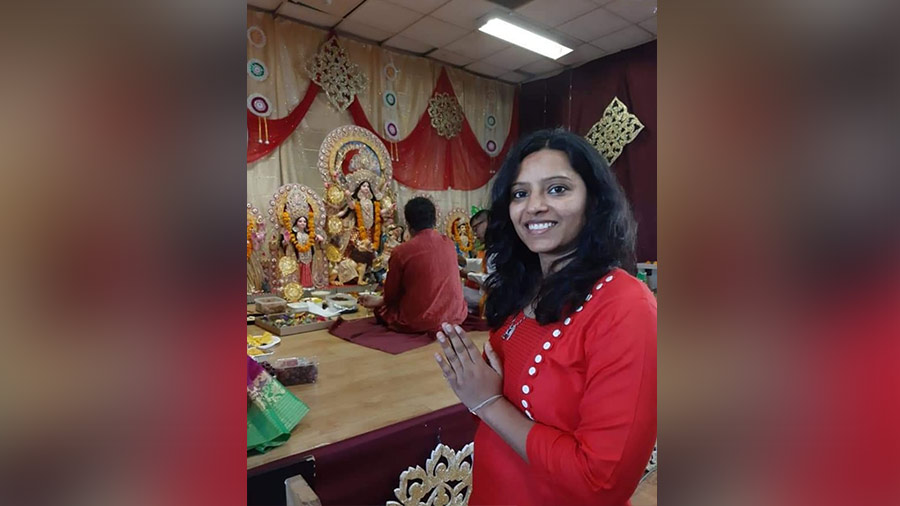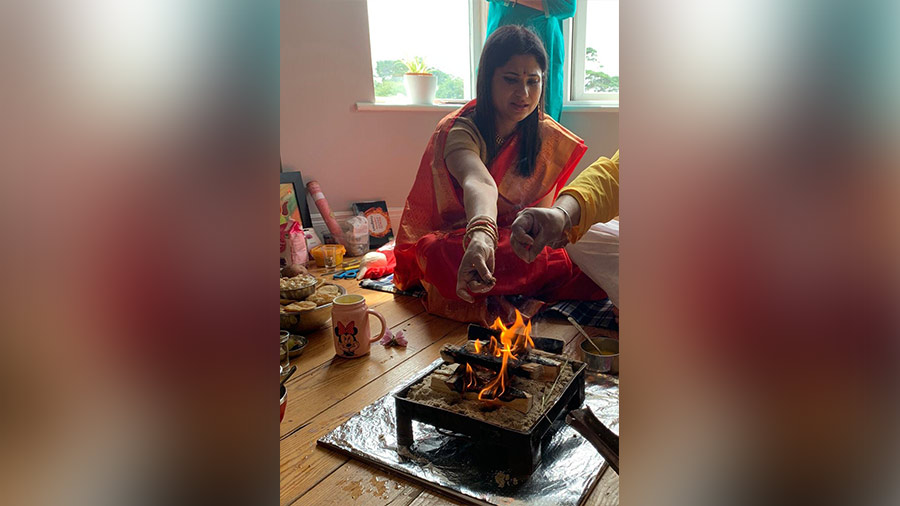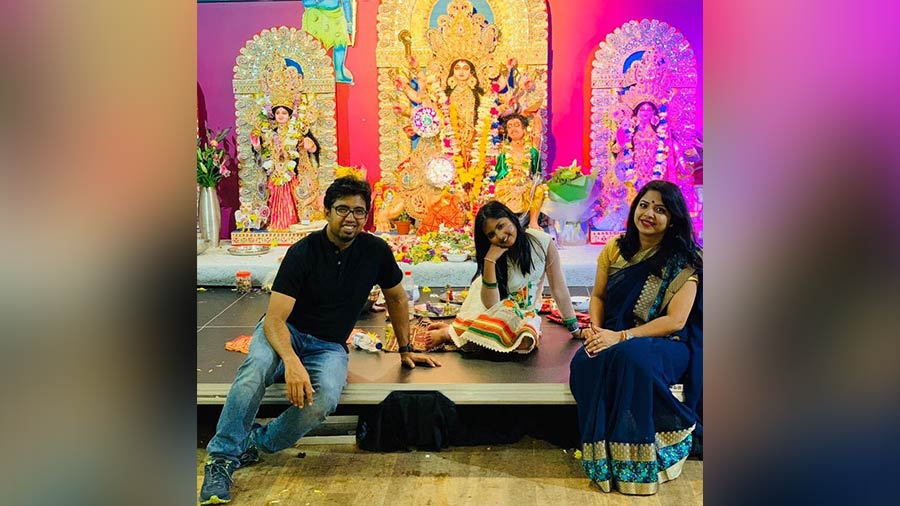Shital Gupta, 37, grew up in a Bengali neighbourhood in Delhi and has always been mesmerised by the grandeur of Durga Puja. When she shifted to Dublin, Ireland, in 2019 as a CA, she was naturally attracted to the Ireland Durgotsav Committee.
After completing her online priest course that year, Shital is now all set to assist committee members Malay Chatterjee and Saswata Chatterjee in performing the committee’s Durga Puja.
“If everything goes as planned, the committee will allow me to conduct their puja all by myself with an assistant in a few years,” said a beaming Shital.
Like her, two others had also applied for the online course and are involved in Durga Puja in different parts of Ireland. Despite their caste and gender, these people have taken up one of the most difficult pujas to perform just to keep the legacy of Bengal in Europe ticking.
Handing over the baton
Anamika Chaudhury, 40, an IT professional, grew up in Banaras. After shifting to Ireland, she took up an online course under Adarsha Baidik Chatuspati and was taught the minute details of Durga Puja to pass the knowledge on to the next generation.
“When I came to Galway, Ireland, the Indian community would celebrate Holi and Diwali but not Durga Puja, as they could not find a priest who was confident enough to perform Durga Puja. This year, we are holding our own Puja in Galway,” she said.
The lack of priests is also a main reason why Tripura-based Bijay Acharya took up the course. About eight years ago, when he came to Dublin and got associated with the Ireland Durgotsav Committee, Acharya realised that looking for a capable priest was one of the most difficult tasks. “Once we had hired a priest from the UK but after he passed away, we faced a huge crisis. It was then that I decided to master the rituals.”

Shital Gupta Ireland Durgotsav Committee's puja Photograph: Shital Gupta
Course details and challenges
Besides being a five-day festival, one has to have an eye for the minutest details of several nitty gritties associated with Durga Puja. Along with the grammatically correct incantations, there are specific mudras, sitting postures and order of the rituals according to the Hindu almanack and calendar.
“One has to master all these to be able to perform something as big as Durga Puja,” said Sudhanshu Acharya, a priest from Kolkata.
As a result, Gupta, Chaudhury and Acharya not only learnt the mantras but the correct pronunciation as well.
“I attended two to three weekly online classes spread over four months. At the end of the course, I had to appear for a test to become a certified priest,” said Chaudhury.
While Sanskrit proved to be slightly difficult for them, the main challenge was taking time out for the course. “After family and work, I really struggled to get time for the classes and then practice. But I managed,” said Acharya.
Gupta, however, said she would have learnt a lot better in an offline ambience.

Anamika Chaudhury performs puja rituals Photograph: Anamika Chaudhury
Durga Puja in Ireland
Unlike Pujas in the US and European countries, Irish Pujas are not limited to weekends as they strictly follow the Hindu calendar. However, it is not possible every time.
According to Saswata Chatterjee, a member of the Ireland Durgotsav Committee, Dublin, they import all the items from Kolkata, including some fruits and flowers. “We use 108 lilies instead of lotus for Sandhi puja. People come from several cities, so we usually have three pushpanjali sessions. Sankalpa puja is done family-wise and hence takes time,” he explained.
Beyond caste and gender
Adarsha Baidic Chatushpathi in Kulpi, South 24 Parganas, is a Sanskrit tolle and the instructor Gourhari Banerjee believes that any person can worship the God. He and other teachers do not discriminate on the basis of a learner’s caste or gender.
“Anyone can offer Puja to the Almighty as long as they are praying sincerely. The course was launched in 2021. Durga Puja is not everyone’s cup of tea — it requires persistence, patience and willpower,” said Banerjee.
Acknowledging the usefulness of the course, Saswata Chetterjee said Bengalis struggled to find a good priest all over Europe. “Whenever someone contacts us, we inform them about this course. Several people from the UK, the US, Germany and Netherlands have shown interest and may opt for this course soon,” he said.
